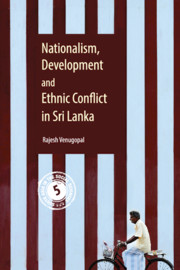Book contents
- Frontmatter
- Dedication
- Contents
- Figures
- Tables
- Preface
- 1 Nationalism, Development and Ethnic Conflict in Sri Lanka
- 2 Sinhala Nationalism
- 3 Kulaks to Clerks
- 4 The Politics of Market Reform at a Time of Ethnic Conflict
- 5 Military Fiscalism
- 6 The ‘Best and Last’ Chance for Peace
- 7 Cosmopolitan Capitalism
- 8 Sectarian Socialism
- 9 Conclusions: Elites, Masses and the Rajapaksa Presidency
- Bibliography
- Index
3 - Kulaks to Clerks
Published online by Cambridge University Press: 01 November 2018
- Frontmatter
- Dedication
- Contents
- Figures
- Tables
- Preface
- 1 Nationalism, Development and Ethnic Conflict in Sri Lanka
- 2 Sinhala Nationalism
- 3 Kulaks to Clerks
- 4 The Politics of Market Reform at a Time of Ethnic Conflict
- 5 Military Fiscalism
- 6 The ‘Best and Last’ Chance for Peace
- 7 Cosmopolitan Capitalism
- 8 Sectarian Socialism
- 9 Conclusions: Elites, Masses and the Rajapaksa Presidency
- Bibliography
- Index
Summary
In 1954, Sir Ivor Jennings, Vice Chancellor of the University of Ceylon and a key figure in the decolonisation period, described a new political phenomenon that he had identified: an ‘undercurrent of opinion which has no direct political representation’:
It is aggressively nationalist and aggressively Buddhist. In language policy it is anti-English; in religion it is anti-Christian; in foreign policy it is anti- Western; and in economic policy it is both anti-capitalist and anti-socialist. Socially it might be described as anti-Colombo, because it consists primarily of English educated young men from the provinces, the sons of small cultivators, minor officials, shop-keepers, and the lower middle-class groups generally (Jennings 1954: 344).
Jennings's brief sketch of this group of young educated lower-middle class men from the provinces is a historical freeze-frame of a social avalanche in the making. What was an ‘undercurrent of opinion’ without political representation in 1954 had just two years later, gained enormous momentum, and went on to dominate and permanently transform Sri Lanka's nascent electoral politics.
The first phase of the nationalist project as Miroslav Hroch describes it, is a time when a small group of intellectual activists initiate scholarly inquiry on linguistic, historical and cultural attributes of the nation (Hroch 1985). In a second phase, these ideas gain some circulation among intellectual circles, but have little political influence before they reach the third stage of mass nationalism. This early cultural nationalist phase of Sinhala nationalism took place roughly over the span of a century from 1850–1950, under the Buddhist revivalist movement, and over the intellectual life-span of Sinhala nationalism's iconic founding father, Anagarika Dharmapala (Seneviratne 1999, Kemper 2015). After a century of incubation in the cultural nationalist phase, Sinhala nationalism was transformed into a contemporary mass nationalism in a moment of explosive political transformation in the mid-1950s, and the angry young men that Jennings describes were the main protagonists.
The trigger factor that catalysed the Sinhala nationalist mobilisation of the time was over the official status of the Sinhala language. The necessity to promote the vernacular languages in place of English had featured as a pending item on the political agenda since at least the early 1940s.
- Type
- Chapter
- Information
- Publisher: Cambridge University PressPrint publication year: 2018



